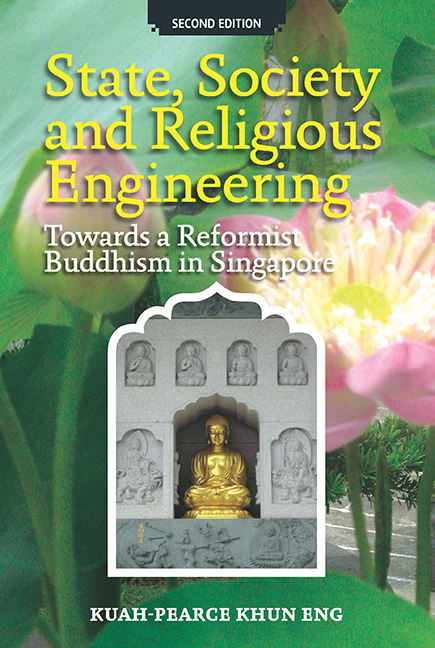Book contents
- Frontmatter
- Contents
- List of Diagrams
- Note on Romanisation
- Preface to the Second Edition
- Acknowledgements to the Second Edition
- Introduction
- PART 1 INVENTING A RELIGIOUS TRADITION
- PART 2 STATE, SOCIETY AND RELIGIOUS ENGINEERING
- PART 3 TOWARDS A REFORMIST BUDDHISM
- Conclusion
- Postscript to the Second Edition: Towards a Humanist and Socially-engaged Buddhism
- Glossary
- Bibliography
- Index
- Frontmatter
- Contents
- List of Diagrams
- Note on Romanisation
- Preface to the Second Edition
- Acknowledgements to the Second Edition
- Introduction
- PART 1 INVENTING A RELIGIOUS TRADITION
- PART 2 STATE, SOCIETY AND RELIGIOUS ENGINEERING
- PART 3 TOWARDS A REFORMIST BUDDHISM
- Conclusion
- Postscript to the Second Edition: Towards a Humanist and Socially-engaged Buddhism
- Glossary
- Bibliography
- Index
Summary
In this study, I have explored how traditional Chinese religion – Shenism – which is part of Chinese culture, is now subjected to a process of religious modernisation. This process of modernisation entails the Chinese moving gradually towards Reformist Buddhism. As a result of the changing needs of the Chinese community, particularly among the younger Chinese, among whom Shenist rituals seem irrelevant to modern religious needs, scripture knowledge is being popularised in its place.
The main players in the process of religious modernisation – the Singapore State, the Reformist Sangha, Reformist Buddhists and the Christians (including the Fundamentalists, Catholics and Liberation Theologists) have been influential in restructuring traditional Chinese religion from Shenism to Reformist Buddhism, offering its adherents an alternative spiritual lifestyle. The Singapore state sees religious modernisation in the Chinese religion as imperative in a variety of ways. First, there is the problem of image. Traditional Chinese religion with its magical and ritual acts is seen as irrational and outdated for a literate population of a modern metropolis. Second, religious engineering is important in order that the Singapore state can continue to maintain the ethno-religious link and that religion is severed from political involvement of any kind. The Maintenance of Religious Harmony Law ensures that each religious group polices its own religious activities and actions and so maintains religious harmony among the ethnic communities. By being involved in religious engineering, the state also ensures that the values that it wants to promote can be integrated as part of the religious discourse of the various religions found in Singapore, including welfare works.
It is possible to argue that Christian activities, especially its aggressive proselytisation serve as a catalyst for the Reformist Buddhists to rationalise and reform existing Shenist practices into modern Reformist Buddhist practices. There has been rapid conversion of the Chinese to Christianity since the 1980s. This increase is at the expense of Shenism and Buddhism.
The state and the Christians have to a certain degree forced a re-evaluation of the Shenist belief system. At the same time, a home-grown group of Reformist Buddhists and monks has matured and readied itself to restructure Shenism and promote Reformist Buddhism. Apart from encouraging the Chinese population to embrace Reformist Buddhism and forgo Shenism, the Reformist Buddhists’ other task is to encourage non Chinese to become Buddhists and to reconvert Christian converts into Reformist Buddhism. They have had some success with this.
- Type
- Chapter
- Information
- State, Society and Religious EngineeringTowards a Reformist Buddhism in Singapore (Second Edition), pp. 291 - 298Publisher: ISEAS–Yusof Ishak InstitutePrint publication year: 2009



